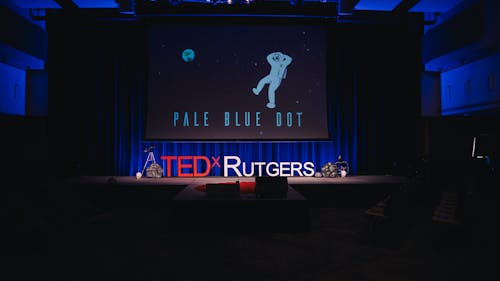TedxRutgers conference brings together student, faculty speakers to share life stories

Last Saturday, TEDxRutgers held its annual conference in the auditorium of the Livingston Student Center, with this year’s theme being “Pale Blue Dot.”
Hersh Patel, a School of Arts and Sciences senior, as well as one of the co-presidents of TEDxRutgers, said "Pale Blue Dot" was in reference to a photo taken by the Voyager 1 in 1990. The image included a small speck, which represented Planet Earth.
Thus, the idea behind the central theme was that people are so focused on what is going on in their lives that they feel the world is a huge place. In reality though, Patel said the universe is much larger than one planet, so the theme was a reminder for people to step back and look at the big picture.
“The purpose of the event is to help attendees find meaning in ‘Pale Blue Dot,’” he said.
There were seven speakers at the conference, two of them students from the University. The first speaker was Brook Getter, a School of Engineering sophomore, who told the story of her upbringing in a religious, technology-deprived society. Inspired by one of her parents, she ended up majoring in computer engineering and leaving the “cage” she was put in.
Another speaker was Ronald Quincy, a professor in the Edward J. Bloustein School of Planning and Public Policy, who described the struggles of people of color. During the talk, he touched on topics such as discrimination of Black people after World War II, and the distribution of wealth between different ethnicities.
The next speaker was celebrity chef and advocate Palak Patel, who has been featured on the Food Network, "The Today Show" and Forbes. She spoke about the importance of eating healthy, explaining the story of how her parents guided her to work in companies around the country. While working, though, she would find herself eating unhealthy foods.
“I constantly found myself eating at my desk or eating on the go. Sounds familiar?” she said during the talk.
Yana Bromberg, a professor in the Department of Biochemistry and Microbiology, delved into the microbiomes inside the body. For her talk, she compared the number of bacteria in different areas, and talked about the community aspect of bacteria.
The fifth speaker was also a student: Alex Louie, a School of Arts and Sciences senior. He recounted the story of the day he received news that he had stage IV cancer. He described the therapy and surgeries he then had to undergo.
“It was kind of like sticking my mouth in a microwave and melting out the cancer cells and spitting them out,” he said.
Louie said, though, that he found happiness through a can of Sprite. Since it was the first time he had tasted something in a while, he realized that something was better than nothing.
The penultimate speaker was Nandini Ramani, the chief operating officer of Outcome Health. Her talk covered the story of how she left her job at Twitter to work at Outcome Health, since she was driven by the mission of healthcare. Although she used to be shy, she said becoming a leader allowed her to learn how to speak for herself.
“Now people tell me to learn to shut up, since I talk a lot and always put my point of view,” she said.
The final speaker for the TEDxRutgers conference was Mason Ameri, an assistant professor at Rutgers Business School. He described the larger problem of discrimination by telling the story of how he changed his name in order to get a job.
“Do we really have to edit ourselves just to make that perfect first impression?” he asked the audience during his talk.
Regarding TEDxRutgers itself, the event takes months to prepare. The team first comes up with a theme by watching videos and going to other talks, Hersh Patel said.
TEDxRutgers first started in 2010, when students got a license from the official TED Conferences LLC, which allowed it to host events for up to 100 people, Hersh Patel said. Those students hosted several conferences, but they were much smaller than this year’s and were also not on a consistent schedule.
In 2016, students part of the team of TEDxRutgers were given the chance to upgrade the number of attendees at its conferences to 500.
“I think that it’s clear that people have interest in TEDx Rutgers. People attend events. People are interested in it. People want to join the club and there is clearly enough interest in it and I think the next step for us should be to build a relationship with students,” Hersh Patel said. “Being in that place where we are not just a conference holder, but we are an idea organization and become more focused on idea seeking.”



